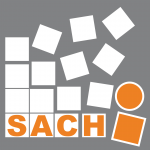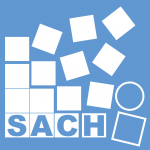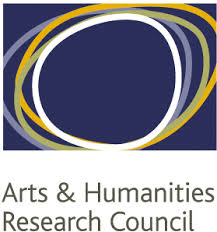News
Next month Dr. Eve Hoggan who is a research fellow with the Helsinki Institute for Information Technology HIIT, Aalto University, Finland will visit SACHI until December. This visit is funded by the Academy of Finland as part of Eve Hoggan’s project – AbiComm: Ability-Based Multimodal Communication. The purpose of this research is to create a mediated interpersonal communication system adapted to the abilities of individual users.
The School of Computer Science in the University of St Andrews are seeking applications for a SICSA lectureship in Human Computer Interaction or a closely related area. Applications from excellent researchers in any relevant area who are keen to cooperate with others within SACHI and the School of Computer Science. We are especially, but not exclusively, interested in those working in HCI and:
- Input and Interaction methods
- Information Visualisation or other techniques relevant to Data Science (e.g. machine learning)
- Ubiquitous Computing or Systems
- Digital Humanities
Full details of the post are here and further particulars can be found here. More details of the students, researchers, academics and adjunct members of SACHI can be found on this website.
Applications for this post are now closed.
Teaching Fellow in Computer Science – SB1407
Description School of Computer Science, Salary: £31,342 – £37,394 per annum pro rata,
Start: 1 September 2014 or as soon as possible thereafter, Fixed term for 9 months
Details Applications are invited for a Teaching Fellowship in the School of Computer Science. In the first instance, at least, this is a fixed-term position of nine months with a start date of September 2014. We require a Teaching Fellow to assist with the development and delivery of high quality, innovative teaching. Applicants should have at least a BSc in Computer Science, preferably a PhD, and previous lecturing and tutorial experience at undergraduate level. Preferably they should also be able to demonstrate ability to deliver a range of core Computer Science courses, in particular within the field of HCI, in classroom, laboratory and small-group tutorial environments; experience in the development of innovative material for learning and teaching; and/or experience of contributing to pedagogical studies in the sciences.
Candidates are welcome to make informal enquiries to the School’s Director of Teaching, Dr Graham Kirby, dot-cs@st-andrews.ac.uk.
This post is for 9 months, starting 1 September 2014 or as soon as possible thereafter
Please quote ref: SB1407
Closing Date: 7 August 2014
Further Particulars: SB1407AO FPs.pdf
School of Computer Science
Salary: £31,342 – £37,394 per annum pro rata
Start: 1 September 2014 or as soon as possible thereafter
Fixed term for 9 months
Jakub Dostal from SACHI and external co-authors published a paper at this year’s DIS conference. The paper was awarded the best paper award, given to the top 1% papers at the conference. This paper is one of the outcomes of a Dagstuhl seminar on Proxemics in Human-Computer Interaction, which Aaron Quigley helped organise and which was attended by several SACHI members.
Dark Patterns in Proxemic Interactions: A Critical Perspective.
Saul Greenberg, Interactions Lab, Department of Computer Science, University of Calgary
Sebastian Boring, Department of Computer Science, University of Copenhagen
Jo Vermeulen, Expertise Centre for Digital Media, Hasselt University
Jakub Dostal, School of Computer Science, University of St Andrews
Abstract:
Proxemics theory explains peoples’ use of interpersonal distances to mediate their social interactions with others. Within Ubicomp, proxemic interaction researchers argue that people have a similar social understanding of their spatial relations with nearby digital devices, which can be exploited to better facilitate seamless and natural interactions. To do so, both people and devices are tracked to determine their spatial relationships. While interest in proxemic interactions has increased over the last few years, it also has a dark side: knowledge of proxemics may (and likely will) be easily exploited to the detriment of the user. In this paper, we offer a critical perspective on proxemic interactions in the form of dark patterns: ways proxemic interactions can be misused. We discuss a series of these patterns and describe how they apply to these types of interactions. In addition, we identify several root problems that underlie these patterns and discuss potential solutions that could lower their harmfulness.
More details about the paper can be found in the ACM Digital Library
 Earlier this year we held the SACHI Logo Contest. To decide on the outcome we formed a jury of 10 people, consisting of 5 academic and 5 student members of SACHI. We are pleased to announce that the best student design for our logo contest was submitted by Jason T. Jacques, which you can see to the left. Both the academic and students members of the jury selected Jason’s logo as the best student design.
Earlier this year we held the SACHI Logo Contest. To decide on the outcome we formed a jury of 10 people, consisting of 5 academic and 5 student members of SACHI. We are pleased to announce that the best student design for our logo contest was submitted by Jason T. Jacques, which you can see to the left. Both the academic and students members of the jury selected Jason’s logo as the best student design.
The logo submitted by Uta Hinrichs, while not eligible for the student prize, was the top ranked entry and has been chosen as the logo to represent SACHI going forward. Congratulations to both Jason and Uta! You can see Uta’s logo options below which we will be adding to our website (once redesigned in the months ahead). We also apologise to both Uta and Jason for reducing their submissions into these blog worthy thumbnails which do neither justice.



Congratulations to Per Ola who has been awarded the RSE/Makdougall Brisbane Medal by the Royal Society of Edinburgh in their Royal Prizewinners list for 2014. The Prize was founded in 1855 by Sir Thomas Makdougall Brisbane, for particular distinction in the promotion of scientific research.
Professor Aaron Quigley said “We are all delighted at the rightful recognition of Per Ola and his world-leading achievements. Last year he was the only UK member of the TR35, the most prestigious annual list published by MIT Technology Review. And now the Royal Society of Edinburgh has recognised his research. Per Ola is an excellent colleague who brings real enthusiasm, insight and dedication to whatever he does. Be it supervising an honours student, teaching, leadership in SICSA or working with industry. His work in intelligent interactive systems is laying the ground work for how the world will interact with computation in the future.

RSE Medal Winners (Per Ola on the right) – credits
 On Thursday 6 February 2014 the Minister for Universities and Science, David Willtts MP, announced funding of £4.6 million for 21 Digital Transformations in the Arts and Humanities projects as part of the Arts and Humanities Research Council (AHRC) investment in Big Data.
On Thursday 6 February 2014 the Minister for Universities and Science, David Willtts MP, announced funding of £4.6 million for 21 Digital Transformations in the Arts and Humanities projects as part of the Arts and Humanities Research Council (AHRC) investment in Big Data.
Along with colleagues in the Department of English & Scottish Literature and the School of Informatics in the University of Edinburgh Aaron Quigley and Uta Hinrichs have been awarded one of largest of these grants for the project Palimpsest: an Edinburgh Literary Cityscape. In this project they aim to create a new, visualised literary cityscape, based on an extensive dataset of literary texts. This project has a focus on Edinburgh but the plan is for the techniques, methods and tools to apply to other UNESCO World Cities of Literature or indeed any literary city.
Palimpsest will be available to an online community of remote visitors, those with an interest in the literature of Scotland and its constituent places who explore the city and its culture from a distance. Palimpsest arises out of the idea of creating an innovative way of engaging people with literature, and drawing on literature’s own dependence on, and engagement with, place and space. Exploration of the relation between urban places and literature first arose in sociology in the mid 19th century. This project represents an excellent example of SICSA academics working together with colleagues in the humanities in making voluminous and varied data accessible for all.
Professor James Loxley from the University of Edinburgh said “We are looking forward to working with expert colleagues at St Andrews on this project. Palimpsest is all about learning to look at the literary writing of Edinburgh in ways that reveal collective imaginative investments in place and patterns within the work of individual authors. Visualisation is key to this – we want to be able to see the literary city, and the city in literature, in new and exciting ways that are also intuitively comprehensible to users coming to the resource for the first time.”
Of the overall funding, Universities and Science Minister David Willetts said: “Getting quality data out of the hands of a few and into the public domain is an important goal for this Government. This funding will help to overcome the challenge of making vast amounts of rich data more accessible and easier to interpret by the public. These 21 projects promise to come up with innovative long-lasting solutions.”
Professor Andrew Prescott the Digital Transformation theme Leadership Fellow commented; “The exciting projects announced by the Arts and Humanities Research Council illustrate how the arts and humanities can help exploit the opportunities offered by these vast data resources. They cover an amazing range of subject areas, from classical history and more efficient retrieval of information about music to the use of online gambling data for more accurate political analysis. By developing better tools for the visualisation and analysis of data, these projects will have significant impact beyond the arts and humanities and will assist the UK in grasping the economic and social opportunities offered by big data.” [1]

This March, Anne-Marie Mann will attend the Workshop on the Impact of Pen and Touch Technology in Education (WIPTTE 2014) in College Station, Texas. This conference focuses on the potential of pen and touch-based computing in education environments. Now in its 8th year, approximately 150 participants from industry, academia and education travel to WIPTTE to share their tools, experiences and ideas using this new hands-on technology. This year the Keynote Speakers are Barbara Tversky (Columbia University) and Randall Davis (MIT) .
Anne-Marie has been awarded a registration scholarship and will present her paper “Digital Pen Technology’s Suitability to Support Handwriting Learning“, co-authored with Uta Hinrichs and Aaron Quigley, during the conference. Anne-Marie hopes that the conference will provide an opportunity for open discussion regarding her recent study and research interests that will prove useful during future projects.
There are many experiments in Computer Science, from eye tracking to mobile security or gestural interaction to navigation in virtual worlds. Such experiments are particularly common in Human Computer Interaction (HCI) and we are continually looking for people willing and interested in participating in our studies.
To make it easier for us to reach and contact interested people, and for you to stay informed about our exciting experiments, we are launching our new participant database. If you are interested in participating in our studies, get a chance to interact with the newest toys and technical equipment and would like to stay informed about the ongoing experiments in Computer Science you can sign up using our registration form.
We will try to contact you only for relevant experiments. We aim to restrict the messages you receive based on the data you provide. Should you decide that you don’t want be in our database any more, you can be removed anytime, no questions asked. If you like the idea of staying up to date on our ongoing user studies and know others that might find this useful, please share this announcement with them.
Researchers from the School of Computer Science that are interested in contributing to our database or using the database to promote your experiments should contact Michael Mauderer or look into the CS Wiki.
(Please note this competition is open to any student in the University of St Andrews)
The St Andrews Human-Computer Interaction Research group (SACHI) is one of the leading research groups in Human-Computer Interaction in Scotland and the United Kingdom. To accompany our current growth and increased impact and international recognition, we are planning to redesign the image of the group, starting with its logo.
We have decided to open the design of the logo to any students in the University of St Andrews. We are looking for a logo that:
- Looks and feels contemporary
- Is original, recognisable, and distinguishable from other similar institutions
- Can be integrated in a range of media (e.g., websites and paper)
Prize:
- One submission will get a 100 pound gift voucher.
- The author of the winning logo will be acknowledged in the group’s webpage.
Notice that:
- The logo can have one or more forms (e.g., one with letters and one without) for flexibility of use in different contexts
- The logo can, but does not have to, include the text “SACHI” or any subset or super-set of these letters
- The logo can, but does not have to, be graphically connected with the activities of the group, namely: human-computer interaction, information visualization, intelligent user interfaces, input devices, interaction techniques, computer-supported collaborative work. For more inspiration from the research themes of the group, please take a look at our soon-to-be-redesigned web page (http://sachi.cs.st-andrews.ac.uk )
Requirements:
- The logo should be original, free of royalties, and not include any element owned by third-party (e.g., existing fonts, dingbats, or external logos, even if these are open source/open access/royalty free).
- The logo should be usable for a number of graphical and non-graphical media, including web, software and paper-based media.
- The logo should have a small version that can be recognisable that is 50 pixels in its minimum dimension (horizontal or vertical).
- The logo should have a greyscale version that can be recognisable (note: these version does not have to be just a greyscale conversion of the full-colour logo).
Submission:
- The logo or logos will be submitted in a single pdf, in at least three sizes (small = 1cm, medium = 3cm, large 10cm), and with a version in greyscale or black and white for each of the sizes.
- The logo or logos will include an explanation of the logo in text of at least 50 words.
- The logo or logos can be accompanied by a preferred colour scheme.
Rules:
- The winning logo will be chosen by a jury chosen from the SACHI staff and students. Although members of SACHI are encouraged to submit their logos, they will not be able to be both submitters and judges.
- The contest may be left with no winners (no new logo from the submissions is adopted) but, if this is the case, there will still be a 50 pound prize to the best design.
- Submissions need to be sent by e-mail to aquigley@st-andrews.ac.uk before January 31st2014, 12:00pm GMT. Send any further queries or questions to this address.


